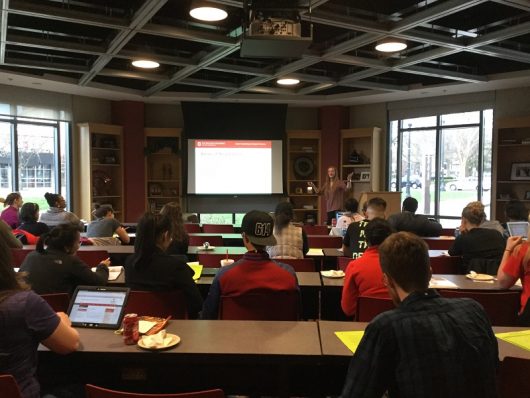
Students participate in a workshop to learn salary negotiation skills, hosted by the University Career Services Committee and the Multicultural Center in honor of Equal Pay Day. Credit: Erin Gottsacker | Lantern reporter
In honor of Equal Pay Day, the University Career Services Committee and the Multicultural Center hosted an event for Ohio State staff and students to teach the fundamentals of how to negotiate for a fair salary.
April 4 marked Equal Pay Day, the point in the current year when women have earned the same amount that men earned in the previous year, using the statistic cited in the Washington Post that women earn 79 cents for every dollar men make at work.
“We thought this would be a good opportunity to help people hone in on some of those salary negotiation skills that are often missing, especially in women,” said Aisha Echols, a career resource coordinator with the Office of Student Life who helped to organize the workshop. “A lot of times we miss out on a lot of benefits that we may not have been aware of because we didn’t ask for them or didn’t negotiate.”
At the event, Jacqui Hoke, a career counselor, explained several techniques that people can use to negotiate for a salary when beginning a new job.
First, delay discussing salary options until offered a position. This will give the applicant the upper hand in salary negotiations, she said.
Talking about salaries too early, however, she said can give employers the opportunity to weed out candidates who are demanding high salaries, while offering less than they had originally intended to candidates seeking lower salaries.
“Once an employer gives you an offer, you have power,” Hoke said. “Now, it is the norm to negotiate, but how you do it matters.”
Hoke recommends researching market trends and being aware of needs and values when considering negotiating a salary.
“Remember, though, not only are you asking about a starting salary, but all of your future increases, your bonuses, your retirement benefits — a lot is based on this first salary,” Hoke said. “The highest jumps in your pay come when you start a job. Negotiating could make a big difference over time.”
Negotiating skills like these are important for all people regardless of gender, she said, but societal norms can place pressure on women to appear friendly, empathetic and as good listeners, which can present a challenge when women are trying to assertively negotiate a salary.
This may be one reason why the pay gap exists, she said, listing other reasons such as research showing that women self-select into lower paying fields, women often have greater caregiving responsibilities and women may value other benefits more than a salary.
About 30 OSU students and staff members attended the event, and most were women.
One of those women, Mary Beth Wilson, is a post-doctoral researcher in the Department of Plastic Surgery. She said she attended the event because she wants to gain negotiation skills and knowledge as she looks to make her next career move.
“Many women just don’t realize that this is possible, and they need to know that they should (negotiate),” she said. “Just because there’s the assumption that you’re going to leave to have kids at some point doesn’t mean that you shouldn’t be paid for the work that you’re doing.”
For Hoke, it’s ultimately important that people know the effect that negotiating can have on their salaries.
“I think that in some ways it’s unfair that just because one person is raised knowing the rules, that they get more money, when another person could be super competent and awesome, and they just don’t know (how to negotiate),” she said. “Let’s give everyone the tools so we’re all on the same playing field.”
The Engaged Scholars logo accompanies stories that feature and examine research and teaching partnerships formed between the Ohio State University and the community (local, state, national and global) for the mutually beneficial exchange of knowledge and resources. These stories spring from a partnership with OSU’s Office of Outreach and Engagement. The Lantern retains sole editorial control over the selection, writing and editing of these stories.



